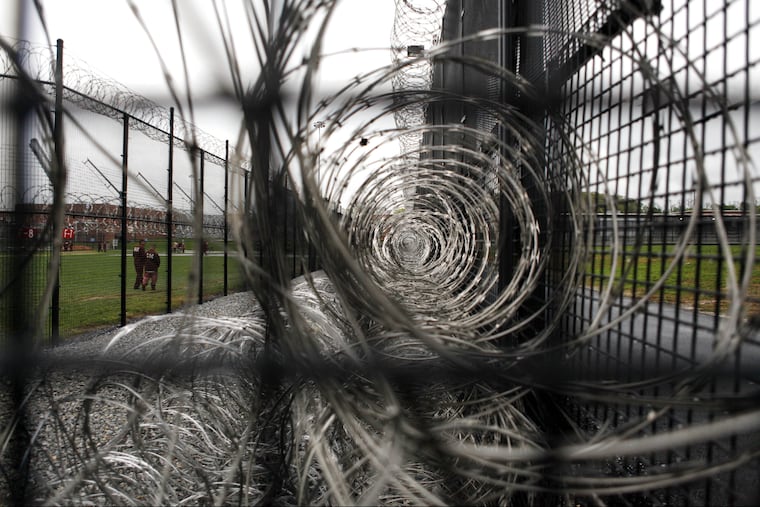ACLU prepares to sue Pa. prisons over new mail policy
Criminal and civil lawyers who represent inmates have been in panic mode. A federal First Amendment lawsuit is in the works.

Ever since the Pennsylvania Department of Corrections announced a new, unprecedented policy for handling legal mail — part of a wide-ranging crackdown meant to stanch the flow of drugs into state prisons — criminal and civil lawyers who represent inmates have been in panic mode.
Many, including staff lawyers with the Pennsylvania ACLU, the Pennsylvania Institutional Law Project, and private firms, said they can no longer ethically send confidential documents to clients, given the potential for exposure in the DOC's new protocol. Before, staff opened legal mail in the presence of inmates, searched it for contraband and handed it over; now they photocopy it, still in the inmate's presence, pass on the copy, and preserve the original for 45 days.
"The practices they've implemented are tremendously disruptive, and in fact are prohibiting a lot of lawyers from being able to use the mail to communicate with their clients," said Pennsylvania ACLU legal director Vic Walczak.
He and colleagues have stopped sending mail since the Sept. 10 policy announcement, and expect to file at least one federal First Amendment lawsuit in the next few weeks.
Amy Worden, a DOC spokesperson, said confidentiality is ensured because mail is opened only in the inmate's presence, and the original, placed in a sealed envelope, is secured and collected by "a contracted vendor that specializes in the destruction of confidential documents — the same type of service that is used by businesses including law offices, medical offices, accounting firms and banks to dispose of their confidential documentation."
But lawyers say they've heard reports of legal documents piled on desks or heaped into trash bags.
"My greatest fear is that my legal mail will become the reading material of the superintendent or, worse, my opponent," said Leticia Chavez-Freed, a Harrisburg civil-rights lawyer who, before the new policy was enacted, sent out 60 or 70 letters to inmates in any given month. "I currently have cases where guards and superintendents are named defendants. My plaintiffs are in their care, day in and day out."
Lawyers said such fears have already resulted in weeks-long backlogs in requests for legal phone calls at some institutions, while other prisons are now refusing to accommodate such calls unless a court date is imminent. The standoff has also rippled into the court system, where lawyers say they're having to inform judges they need extensions in order to carve out time to drive hours to far-flung prisons for in-person visits. (The DOC did not respond to questions about changes to phone and visitation policies for lawyers.)
"It makes it difficult to communicate with your client, which we're obligated to do under the rules of professional responsibility. We're also required to maintain client confidentiality," Philadelphia civil-rights lawyer Susan Lin said. "How do we have that communication when there's a huge danger that confidentiality won't be maintained?"
The DOC in August put the entire prison system on a two-week lockdown, then announced $15 million in security measures including drone-detection equipment, state-of-the-art body scanners, and a Florida-based service where inmate mail is being scanned and digitally forwarded to the prisons. The DOC said the policies, including the termination of book-donation programs, were necessary to keep out drugs, in particular the synthetic cannabinoid K2, that the DOC said were sickening staff — though experts in medical toxicology say it is unlikely staff could be sickened by incidental exposure.
>> READ MORE: Pa. prisons spend $15M after guards were sickened by K2. But what if it was just in their heads?
The ACLU and others wrote to the DOC, calling the new legal-mail procedures "overbroad and unjustifiably intrusive," insisting that legal mail had not been shown to be a source of contraband, and urging the DOC to find a better solution. They said no other institution in the country has such a policy. The DOC did not respond to questions about whether there was any precedent for this practice.
"We've gotten reports from dozens of lawyers who are involved in criminal appeals and civil issues, who can't communicate with their clients, and these individuals' cases are being harmed and delayed," said Alexandra Morgan-Kurtz, a Pittsburgh-based lawyer for the Pennsylvania Institutional Law Project, an organization that sent hundreds of legal communications to incarcerated clients each week up until the new protocol was enacted.
She and others are suing the Department of Corrections, its staff and its contractors over allegations ranging from physical and sexual assaults to inadequate medical care that inmates say led to unnecessary amputations.
Inmates have reported long lines to retrieve legal mail at some institutions, Morgan-Kurtz said. At others, there have been copies missing pages. Other prisons appear not to be enforcing the new policy at all. She also said some staff were reportedly not wearing protective equipment while copying mail despite the DOC's concern about K2 exposure. The DOC didn't respond to questions about the use of protective equipment in the mailrooms.
Morgan-Kurtz said attorneys who have made in-person visits this month have in some cases been prevented from bringing in documents to review with clients, cutting off their last avenue to share the information confidentially.
"There are many barriers in place already between us and our clients, and this is just maximizing those barriers," Chavez-Freed said. "It's really cutting off people's access to the courts."